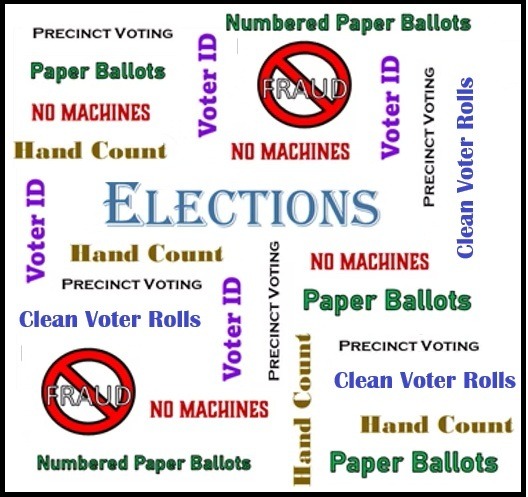
Data Collection Disguised as Election Integrity
HB 339 allows the Secretary of State to collect enormous amounts of data about all Idaho Voters for the purpose of verifying voter rolls, but it fails to clean Idaho voter rolls and allows many loopholes for fraud.
8/4/20256 min read
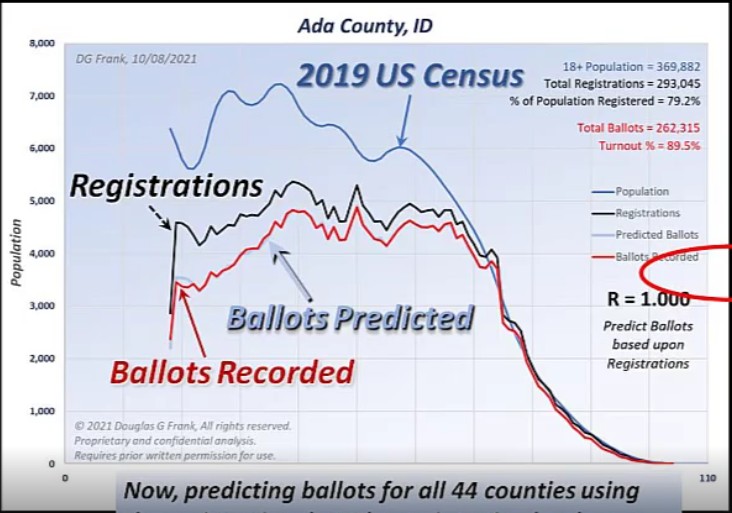

Three years ago Dr. Douglas Frank gave a Presentation about Voter Fraud in Post Falls that proved that Idaho’s Voter Rolls were corrupt. He pointed out patterns in the number of voters registered in each county, as well as ballots cast in the 2020 election, that showed clear signs of computerized manipulation of Idaho’s election data.
Dr. Frank had already proven similar problems exist in many other states, but proof of fraud in Idaho’s 2020 elections came as a surprise to many residents, who had no idea that even the most conservative states’ elections were subject to machine fraud.
The problems raised by Dr. Frank created enough of a stir that in 2023, the Secretary of State requested and was granted $10 Million dollars over five years to “upgrade the state’s elections system.” But no details about what the plan entailed were evident until the following year, when House Bill 339—Regarding Elections was introduced.
This is the third in a series of articles exposing the problems with Electronic Voter Registration. Other articles include E-Registration Opens Door to Fraud, Digital ID and Phantom Voters , and Phantom Election Management.
HB 339 Leaves Loopholes for Fraud


HB 339 laid out the SOS’s plan to “maintain the accuracy and integrity” of Idaho’s registration system by collecting enormous amounts of information on all Idaho voters, and periodically reviewing this data in order to purge registration records of fraudulent, deceased, relocated, felonious, or unqualified voters.
Unfortunately, there are serious problems with the approach that HB 339 takes to detecting and removing fraudulent voters. The bill is four pages long and very complex. It authorizes the SOS Office to collect almost unlimited information about Idaho voters from many sources and to share this information with unnamed “commercial data providers”. It is claimed that the data will be checked against Idaho's voter rolls, but how “inconsistencies” will be dealt with, if any are found, is not clear.
Open Ended Data Collection and No End of Fraud
HB 339 authorizes the SOS to collect, store, and process much more data than is needed to verify voter eligibility and registration data. There are huge privacy and security problems with such broad and open-ended data collection, but even worse, HB 339 leaves many loopholes for systematic manipulation of Idaho voter rolls. In other words, it does not and cannot clean Idaho’s voter roles.
A short analysis of all the problems with HB 339, including issues related to mass data collection, are given at the end of this article in the form of a letter addressed to Idaho legislators. For now we will focus on the charge that HB 339’s plan for voter list verification still leaves HUGE loopholes for fraud. How is this possible?
The letter outlines three problems with HB 339’s approach to voter roll verification.
New registrations will not be “verified” until months after registrants have already voted.
Phantom registrations may be impossible to detect if they were created using driver license information from real residents.
HB 339 proposes to use so many sources to verify registration data that irrelevant inconsistencies may be flagged, and valid voters are likely to be removed from the rolls.
The second of these problems is discussed at length in the article Digital Identities and Phantom voters, so we will focus on the other two issues, beginning with the problem of delaying verification until long after fraudulent registrants have voted.
Registrations Must be Verified Without Delay
HB 339 provides for processing registrations all at one time, 90 days before an election. But this will be entirely ineffective in preventing new, potentially fraudulent registrants from voting, since for any given election, almost all new registrations occur AFTER the SOS plans to verify registrations. The following chart shows Kootenai County’s new voter registrations in the six months leading up to the 2024 election:
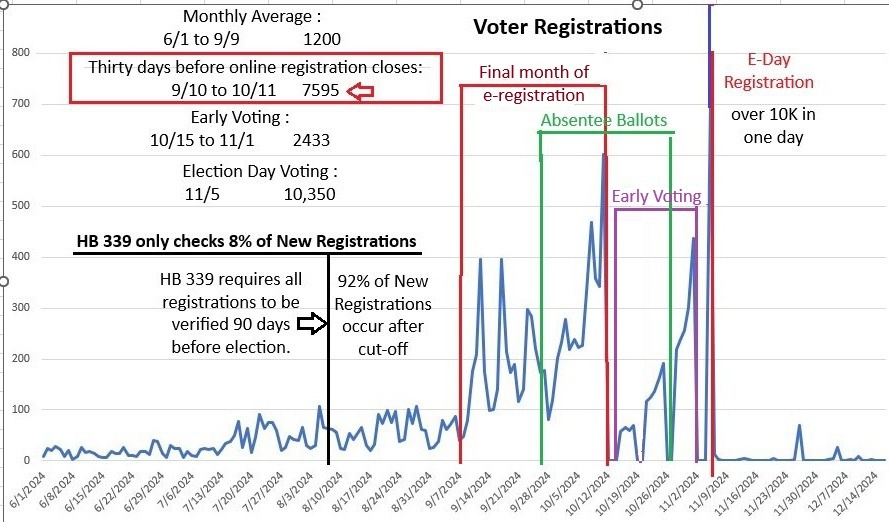

This chart shows that only about 2000 of the 14,000 people who registered to vote in the 6 months prior to the November 2024 election registered before the 90-day “cut-off”. Neither the 9,000 who registered online or by mail after August 7th, nor the 12,000+ who registered in person at the time they voted, could possibly be prevented from voting as a result of HB 339’s system of verification.
And it goes without saying that having 24K "new" registrants in six months, in a county with a population of only 150K eligible voters, indicates a problem, not only with verifying applicants, but with removing valid voters. At least a quarter of “new" registrants have active voting records, so why were they removed from the rolls in the first place? The constant churning of voter rolls makes finding fraudulent voters harder. And even if an illicit voter was discovered by HB 339's method of “auditing and verifying” voters, what would prevent him from immediately re-registering?
The reason for reviewing the entire Idaho voter database all at once, 90 days before the election is that federal law prohibits removing registered voters from the rolls during that period. But there is no reason anyone should be added to the voter rolls before they are thoroughly verified.
The only way to effectively clean Idaho’s voter rolls, and to keep them clean is to make the registration process more rigorous, by preventing ineligible or phantom voters from registering in the first place. And this can only be done by eliminating online registration, making mail-in registration requirements more rigorous, and verifying citizenship of all applicants before confirming their registration.
Overcomplicating Verification Creates Chaos, Solves Nothing
Another disturbing problem with HB 339 is that it authorizes the Secretary of State to collect almost limitless amounts of data about every Idaho voter, but is not explicit about what he is allowed to do with it. And it is also not clear what he will do when he does find inconsistencies.
Presumably the SOS intends to compare names, addresses, birthdates, SSNs, and DLNs to dozens of public and private records, and try to discern citizenship and criminal status. But even if the SOS finds inconsistencies in personal records collected from dozens of public and private agencies, that doesn’t necessarily mean a voter registration record is fraudulent.
Many inconsistencies in personal records have no bearing on voting eligibility. For example, many legitimate voters 1) use variations of their given name or nicknames 2) are recently married or divorced 3) have more than one regular residence, 4) move frequently due to job or schooling demands, 5) live part-time with friends or relatives, 6) reside in nursing homes or care facilities, etc. etc.
So if the SOS and unnamed private corporations compare voter registration data against dozens of other personal records, and find inconsistencies, then what happens? HB 339 provides no guidance regarding actions to be taken.
According to Idaho law, if a person presents acceptable proof of identity and residence at the time he registers to vote, and if he presents himself to vote in person, with current ID on a regular basis, he should not be removed from the voter lists. So there is no legitimate purpose to the types of “consistency” checks that HB 339 provides for.
The truth is, Idaho’s traditional method of registering voters in-person with proper documentation is sufficient, combined with timely use of the DHS SAVE system to confirm citizenship before the registration is verified. ID 34-411 provides specific types of allowable documentation to prove identity and residence, and Idaho’s long standing system of removing voters who have died or been convicted as felons, or re-registered in another precinct on a monthly basis is also sufficient.
It was electronic registration, centralization, and computerized management of voting records that created chaos and opportunities for fraud in the first place, and HB 339's solution to the problem, is more centralization, and computerized management of voting records.
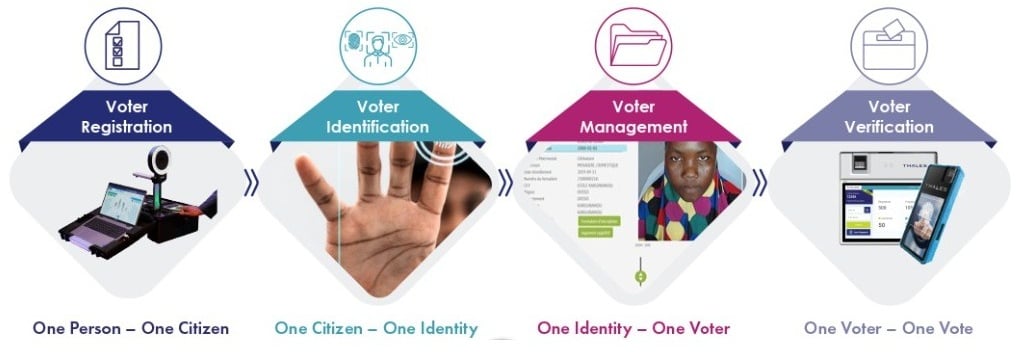

Open Letter to Idaho Legislators
The following letter was composed by an Idaho resident affiliated with Stop SMART Cities, and was emailed to legislators in advance of the March 11 hearing before the Senate State Affairs Committee, and it covers most of the major problems with HB 339 succinctly. (Download PDF here)
The author was concerned about the mass data collection allowed by to HB 339 as well as the enormous loopholes the bill allowed for continued voter registration fraud. But the letter also raises an additional concern that HB 339 specifically allows the SOS to share this data and collaborate with unnamed “commercial data providers”. This raises the possibility that the true purpose of HB 339 is not to clean up voter rolls, but rather, to allow AAMVA to establish a database of Idaho resident records to provide for a planned transition to Digital Driver's Licenses?
Will "Election Integrity" be the excuse that political leaders use to foist digital driver's licenses and biometric ID on Idaho citizens? Time will tell.
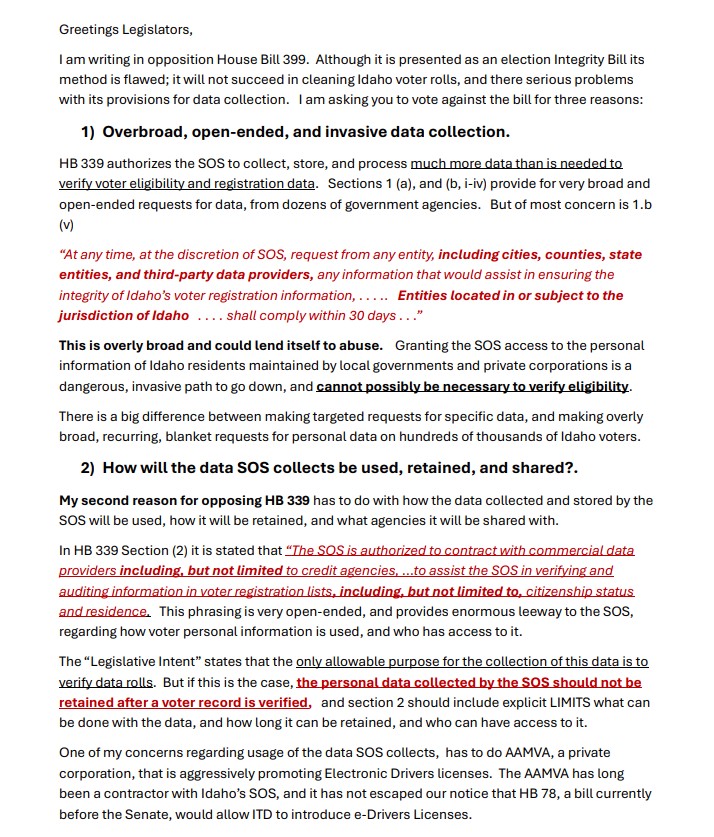

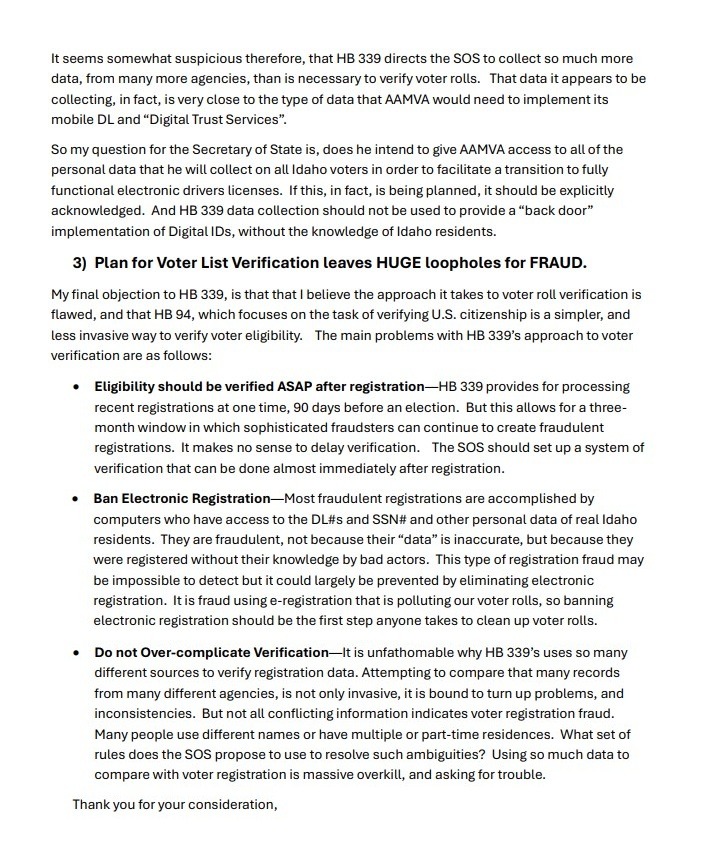

Empowering Voters
Advocating for transparent, honest, and decentralized voting systems.
Please subscribe to the Eye on Elections Newsletter.
Contact us:
© 2025. All rights reserved.
